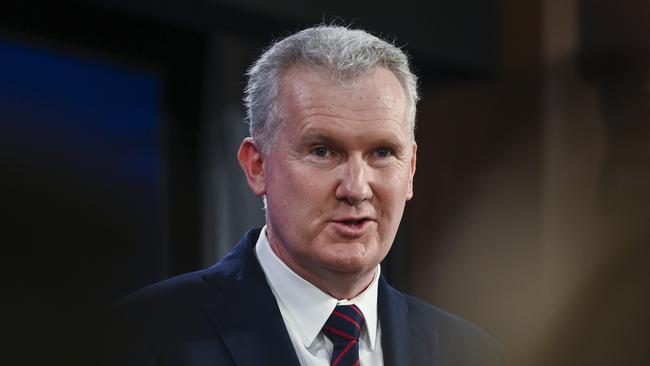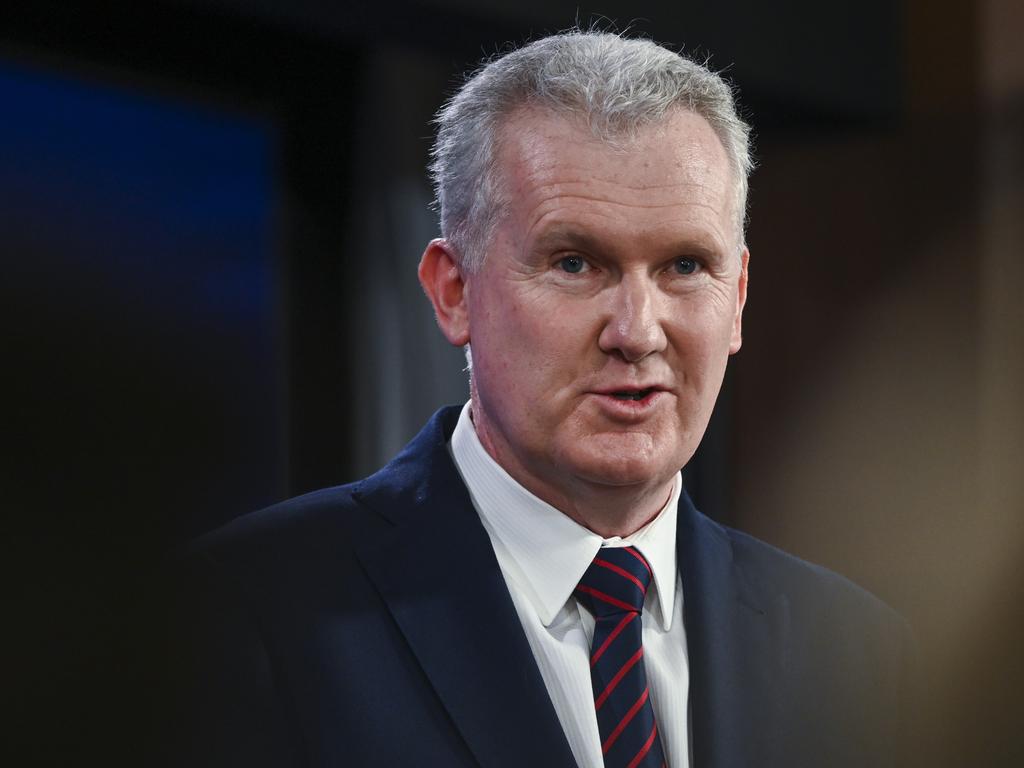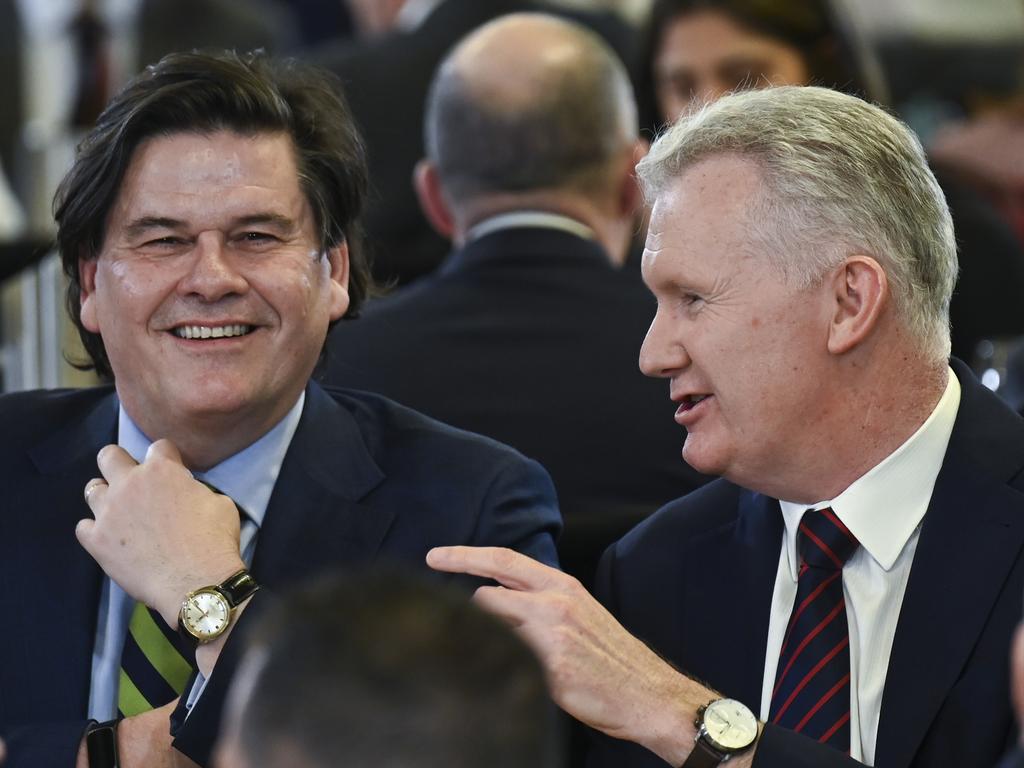Labour hire laws delayed, small business exempt
Labor seeks to mitigate employer opposition and win Senate crossbench support for its industrial relations shake-up.

Small business will be carved out of Labor’s “ same job, same pay” laws and the controversial reforms will be delayed by 12 months as the Albanese government seeks to mitigate employer opposition and win over Senate crossbench support for its industrial relations shake-up.
As Workplace Relations Minister Tony Burke introduces the Closing Loopholes bill in federal parliament on Monday, the government has also offered an olive branch to mining companies by revealing a new test to prevent specialist contractors being inadvertently caught up in the laws.
Mr Burke said the small business sector would not only be exempt from the new labour hire laws but be granted concessions across other key elements of the bill, including wage theft, and casual conversion. It would also not have to provide paid time for union delegate training.
Mr Burke said new payment obligations under the labour hire changes would not take effect until November next year.
Citing Department of Employment and Workplace Relations data that showed only 67,000 workers would be affected, the minister insisted the changes would have a negligible economic impact.
ACTU secretary Sally McManus told The Australian the union movement was opposed to the small-business exemptions, and highlighted how the overall changes were modest and should have gone further.
Minerals Council chief executive Tania Constable said the labour-hire changes would be a “dagger to the heart of investment in this country”, resulting in higher costs across the economy.
The government wants to close a labour-hire loophole where an employer and employees have agreed in an enterprise agreement to a particular rate of pay for particular work, but then the employer brings in different workers through labour hire to undercut that rate of pay.
Employees, unions and hosts will be able to apply to the Fair Work Commission for an order that labour hire employees be paid at least the wages in a host’s enterprise agreement.
The commission must not make an order if it is not fair and reasonable in the circumstances, including where an arrangement relates to the provision of specialist or expert services.
It will need to be satisfied the host’s enterprise agreement would apply to the labour hire worker if they were directly employed.
A default three-month exemption period will apply to avoid having an impact on labour-hire arrangements for surge work and temporary replacements. “There will always be a place for labour hire when it comes to surge work, short-term arrangements and specialist staff,” Mr Burke said.
“This legislation does nothing to change that. These changes will affect a small number of workers but, for the workers this affects, closing this loophole will be life-changing.”
The government will continue to face a barrage of opposition from employer groups when it introduces the bill, which includes a maximum possible penalty of 10 years imprisonment for wage theft.
The bill proposes maximum fines of up to $7.8m – or three times the amount that was underpaid if that amount exceeds the maximum fine. This will be the first time the level of penalty can be proportionate to the extent of the underpayment.
Mr Burke said the government would allow four weeks of debate in the House of Representatives before the bill was sent to the Senate where it would be subject to an inquiry. It is unlikely to be passed until November or December.
As revealed by The Australian in July, the bill will enshrine rights for union delegates and enhance the ability of unions to enter workplaces without the required 24 hours’ notice where they believe there is a risk of workers being underpaid.
Mr Burke said union officials would not be able to get access to the pay records of non-union members.
“I’ve seen the fear campaign that we were going to change those rules; we’re not changing them at all, not at all,” Mr Burke said on the ABC’s Insiders.
“That section remains exactly as it already is.
“There’s also been a fear campaign about something about residential premises. There’s a ban on right of entry being used for home businesses and residential premises. That remains completely unchanged as well.”
Ms McManus said the bill contained necessary but pretty modest provisions.
“The heart of the objection from employers is they just don’t want to pay more,” she said.
Ms McManus said unions opposed the small-business exemptions because they resulted in lesser rights for their employees
“We don’t believe people should have less rights simply because of the size of their employer,” she said.
“There’s always a lot of talk about small business but never any talk about the people who actually work in small businesses so we don’t support those carve outs or exemptions or lower standards that are applied there.”
Ms McManus said the gig-economy provisions should be applied beyond digital labour platforms, with minimum standards applied to other workers including freelance journalists.
She said the “same job, same pay” provisions only applied where an enterprise agreement was in place and unions would like the provisions applied generally. But she welcomed the impact the laws should have on the conduct of companies including Qantas.
“Qantas is just one big loophole. The way they have used labour hire they’ve just found every ruthless way they can to game the system and this loophole is finally being closed,” Ms McManus said.
Australian Chamber of Commerce and Industry chief executive Andrew McKellar accused Mr Burke of giving conflicting answers as to how the legislation would operate regarding the gig economy.
“After saying that Airtasker would not be impacted but (aged care platform) Mable would, the minister now appears to accept that Airtasker will be impacted, but failed to explain how this would work with any consistency,” Mr McKellar said
“Tony Burke cannot answer basic questions about whether providers of aged care, cleaning, and gardening services would be impacted differently depending on the platform they use.”








To join the conversation, please log in. Don't have an account? Register
Join the conversation, you are commenting as Logout